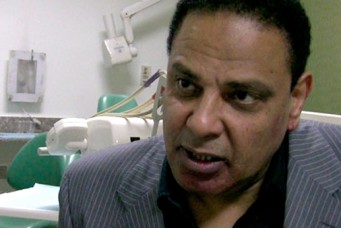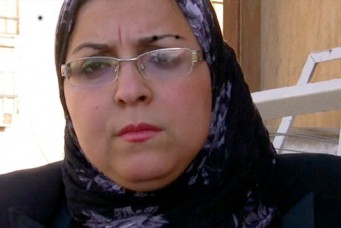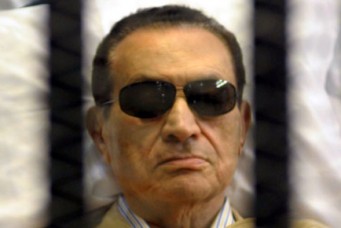Seeking Justice
Longtime activist Aida Seif El-Dawla demands that Egypt’s regime be held accountable for past—and ongoing—human rights abuses

CAIRO REVIEW: What is the human rights factor in Egypt’s revolution?
AIDA SEIF EL-DAWLA: It was crucial. It was an essential component of the revolution. All this is about rights. It was triggered by the Khaled Said case [a young Egyptian killed in police custody in Alexandria in 2010], which was clearly a case of human rights violation, and death under torture. But it is also a culmination of long years of struggle for all kinds of rights: right to organization, to gathering, to democracy, to social and economic rights, to a minimum wage, to the right to strike. At the end, it’s all about rights. The right to have a dignified life and to live a decent standard. And to decide who rules and by which terms. Every revolution is about rights.
CAIRO REVIEW: This is something all Egyptians felt?
AIDA SEIF EL-DAWLA: They might not know the human rights conventions inside and out. I don’t either. But they know they were fighting, they were struggling, they lost their lives, because they wanted better life.
CAIRO REVIEW: What part did the Khaled Said case play?
AIDA SEIF EL-DAWLA: It mobilized many people against the issue of torture. Khaled Said was a middle-class young man. He did not belong to the population that is usually subject to torture—the poor, the marginalized. He was a middle-class young man who used the Internet and was a computer fan. He used the Internet café and posted YouTube videos like so many young people. And I think many young people identified with him. I think his class played a role. The extreme courage of his family. And the identification of young people with him. And the fact it also took place so much in public. And the pictures that were taken by his brother. All these elements put together put him in the center of the campaign against torture.
CAIRO REVIEW: Was it an extreme case?
AIDA SEIF EL-DAWLA: No, it’s the typical case. It happened so many times, in the previous regime, and in the current regime. We have been documenting cases of torture since January 25.
“I’m not pessimistic but I’m worried. And I know it’ll take long, but some people don’t want it to take long. Some people are tired.”
CAIRO REVIEW: Is there a direct line between the Khaled Said case and the mobilization of people on January 25?
AIDA SEIF EL-DAWLA: No, it’s not a clear linear line, of course not. But it was a trigger. People went on the 25th on the Day of Police to defy police. And to reject police policies. What happened between the 25th and 28th was extreme stupidity and brutality by the regime. No one thought that the 25th was going to develop into what it developed into. There was severe brutality by the regime and it seems that the young people were really fed up. The way they challenged and actually ran against those tanks. And the way they picked up the tear gas canisters and threw them back. That was an angry young people. Who by the way didn’t belong to anything. The political groups and the familiar faces and names, they all appeared in Tahrir Square on the 28th. The clash of the demonstrations after midnight on the 26th and 27th, those were angry young people.
CAIRO REVIEW: Your memory of January 25?
AIDA SEIF EL-DAWLA: There was the feeling that there is a defiance that I’ve not seen before. And a courage, incredible courage. And then at one point, it seemed that the security forces had given up for the day. Which happened before, on March 20, 2003, when demonstrations broke out [against] the invasion of Iraq. On March 20, people managed to take over the square. On March 21, it was a massacre. So this was also a concern. They were exhausted. People were coming from everywhere. And they’d retaliate the next day. Well, they retaliated the same night, and that was very brutal. The tear gas was incredible, people got shot.
CAIRO REVIEW: What does the revolution say about the work of the civil society organizations over the years?
AIDA SEIF EL-DAWLA: I think that everybody played a role. I’m not sure that civil society organizations played a major role. You can’t pick and choose now, who said what. Nadim, for example, started talking about torture in 1993. But it never had the impact. It had a major impact on the lives of individual torture survivors and their families, but it never had this major impact on its own. Except when the bloggers joined, before the Khaled Said case. Once bloggers got involved and started posting videos on the Internet, the whole issue took on a whole different dimension. I can’t say, yes, civil society organizations contributed to the revolution. But everything before contributed to it. I can’t overlook, for example, three years of daily worker’s strikes on the streets, occupying the street outside parliament, etc. I can’t decide what is it exactly. It’s just the injustice became too much. The revolution, this process, has toppled the head of the regime. There’s still a lot more to be toppled before we can talk about the success of the revolution.
CAIRO REVIEW: People around the world, in China, Vietnam, other Arab countries, will be looking at Egypt for lessons as a model.
AIDA SEIF EL-DAWLA: We’re looking at Tunisia for lessons. Tunisia is far ahead of what we achieved. Their president left the country. Ours is still in the country, receiving royal treatment. Okay? They have dismantled the state security apparatus. They have dissolved the ruling party. They have toppled one government and are not letting go except when their agenda was achieved. We have a different situation. We have many people now who are telling strikers in Tahrir to stop, saying “What else do you want?” And those people aren’t just thugs. The violent aspect of it is to a great extent thugs. But these are politicized people, people whose agendas stop at the constitution, elections, etc. It’s funny. A call for the Khaled Said situation provokes the 25th. Now, with all this torture going on, also taken on video, also the victims themselves testifying, nobody wants to hear it. So we still have a very long way to go.
CAIRO REVIEW: What is the situation now?
AIDA SEIF EL-DAWLA: You have one hundred and seventy people now in detention, receiving military trials, right now, right now, as we’re talking. And the lawyers there, they have no access to detainees, they don’t have access to the interrogations, they don’t have access to the trials. And those people may receive very harsh sentences.
CAIRO REVIEW: Why is Tunisia ahead?
AIDA SEIF EL-DAWLA: I think because they have a different leadership. This revolution [in Egypt] did not have a leadership. At least not a clear one. I’m not interested in who was leading behind doors. What matters is who is leading in the square. Tunisia after a while had a leadership: the Tunisian trade union, which is very strong. And they have relatively strong political groups. In Egypt, the situation was different. The leadership developed after the revolution started. People kind of self-appointed themselves as leaders or as negotiators or whatever. And always creating a lot of debate. Not always happy debate, regarding “who are you to represent us,” and stuff like that. For example, one coalition last week called [for] ending of the sit-in in Tahrir. Who are you to decide whether the sit-in should end or not end? Who elected you? That’s a major difference. Also, the size of the country and the strength of the state is different. [Tunisian President Zine El-Abidine] Ben Ali was a tyrant, but so far as a Mafioso can be a tyrant. But Mubarak was heading a very powerful state.
CAIRO REVIEW: What was the role of human rights groups in the protests?
AIDA SEIF EL-DAWLA: Our center is part of a coalition of organizations called the Front for the Defense of Egyptian Protestors. It was set up in 2006 to deal with demonstrations. They’d happen and people would get arrested. The lawyers would go to attend the interrogations. Another group would collect clothes and money and food and take it to the prison. It was all things that wouldn’t last longer than three or four days. But, this [revolution], we weren’t used to this. So as individuals, not part of organizations, we were in the demonstrations every day. My colleague and I actually stayed at the center for eighteen days because we received injured people. Our doctors went for a few days to the field hospital. We provided medicines. We transferred patients from the field hospitals to other hospitals when that was needed. Since things are quieter, we’re documenting. We’re receiving injured people and trying ways to treat them because some of them need sophisticated interventions. We are documenting torture and detentions.
CAIRO REVIEW: Can you review the human rights violations since January 25?
AIDA SEIF EL-DAWLA: We have over six hundred and eighty people who died. The majority of them died with live bullets. We actually had a few people at the center who would come and bring the bullets as evidence that they had shot the injured. Thousands of injured. We’re far from documenting all of them. There are at least two thousand who went to the field hospital. There are problems with hospitals because in many cases hospitals would not give reports of the actual cause of death or injury. And that needed several interventions by doctors and lawyers we know. And then the disappearances, the arrests.
CAIRO REVIEW: What are the figures for disappearances?
AIDA SEIF EL-DAWLA: The figure that we have, at our center, is two hundred. Some of those might turn out to be deceased. The family of one went to the morgue every single day. They were always told he is not here. Then suddenly they’re asked to go and identify a body with a face that had no features. So now they’re going to do a DNA test which can exclude, but can’t confirm. And that’s frightening, considering that nobody sees the detainees. And there are stories of several collections of corpses with different stories on how and why they died. So anyway, it’s scary. There’s a lack of transparency and lack of information. The disappeared are one thing. And those in the court are different. We are, mind you, receiving the tip of the iceberg. And we are receiving Cairo complaints. What’s happening in the governorates? We don’t have the information on that.
CAIRO REVIEW: What do you know about the the episode in Tahrir Square on February 2, when the horses and camels arrived?
AIDA SEIF EL-DAWLA: Our relationship to that event as a human rights organization was documentation of the injured and dead. Who died and where are they? And trying to help the families of the dead get certificates from the hospitals, to get the real reason for their deaths. There were different scenarios to disperse from Tahrir. There was tear gas, and firing, and there was beating and snipers, and there was this farce of the camels and horses. And then there were rumors. We entered a very strong psychological war of stories and rumors. You never know what is right.
CAIRO REVIEW: What is the evidence of the police and army using lethal force against the protestors?
AIDA SEIF EL-DAWLA: It wasn’t Libya, okay? The army did not turn its tanks against the people and shoot at the people. The soldiers in the tanks let people use spray paint to write, “Down with Mubarak” on the tanks. The people were very passionate about the army. This is something the dates back to a long history in Egypt, but we have to understand the army and generals are one thing. And the soldiers in the tanks are another. It’s not the soldiers in the tanks who take the decisions. But it was the same army which on the 28th opened up and let the thugs come into Tahrir to beat up the protestors. It was also the army that flew those F-16s for two days over the demonstrators. Terrorizing. At one point they flew very low. You had extreme vibration in your ears and some people lost consciousness. People need to believe in something. And of course the army is also clever. For example, in the first or second statement by the army, the general salutes the martyrs. This melts the hearts of people. Nobody wants to hear now about the army torturing or arresting. There is this message that’s being propagated that those are thugs arrested by the army, for our safety and security. Many of them are not thugs. And even if they are thugs, you don’t torture thugs, you bring them to trial. They’re protestors. And it’s funny that those people are brought in front of military trials, while the big shots of the previous regime, including Mubarak, who is the high commander of the army, gets interrogated by the normal civil prosecution, and don’t even have to show up.
CAIRO REVIEW: Why is this still happening in Egypt?
AIDA SEIF EL-DAWLA: There is a strong counter-revolution and there is a regime that is trying to maintain itself in power. There is no ‘after the revolution’ yet. And anyone who has the power and presence and police stations are going to use them. If this is what they use to hold on to power.
CAIRO REVIEW: When you say the regime, who do you mean?
AIDA SEIF EL-DAWLA: That’s a very good question. If I asked you before January 25, what would have been the answer? Mubarak is not the regime. He is one person. There is the regime, the old guard, the businessmen who are screaming the country is falling apart because of the strikes, that the economy is falling apart after the strikes. Who’s ruling? I don’t know. This is Mubarak’s army. It’s not a popular army. It’s Mubarak’s army.
CAIRO REVIEW: How do you move forward?
AIDA SEIF EL-DAWLA: As human rights activists, we have very clear demands. Apology, acknowledgement of torture, dissolution of the state security apparatus, people should be brought to justice. And then—only then—can we talk about reconciliation. But the state security apparatus is still there. The rest of the people, they want the minimum wage, they’ll get the minimum wage. They want independent trade unions, and they’ll get independent trade unions. That’s what people struggled for.
CAIRO REVIEW: Is there any meaningful dialogue between the revolution and the army?
AIDA SEIF EL-DAWLA: No. Because the regime picks up who they talk to. There’s the coalition of the youth. Can you imagine if you bring a young person and the high commander of the armed forces sits and talks with him or her as if they’re buddies? Of course, it’s very attractive. But none of those people are independent. Each of those people are representing something political. Be it [opposition figure Mohamed] ElBaradei, be it the National Association, be it the Muslim Brotherhood, be it El-Gabha. The regime is talking with the young people, it’s a big lie. There have been calls on this coalition since the torture stories came out, to stop the negotiations until they stop the torture. Stop the negotiations until they release the detainees. Until two days ago, it didn’t work.
CAIRO REVIEW: You don’t sound optimistic.
AIDA SEIF EL-DAWLA: I’m worried. I don’t think I was ever more worried in my life than I am now. Before, people were very aware of how the situation was. Maybe they felt helpless or weak, but they tried. They saw what was happening. Now people are so tired. And those eighteen days in Tahrir, those were so overwhelming, to the extent that this possibility of a savior in the form of the army, no one wants to question it. They have wiped away the graffiti of Tahrir. The things that should have been kept as reminders of the revolution. They removed the graffiti under the title “Let’s clean our country.”
CAIRO REVIEW: Is holding the regime accountable important for the success of the revolution?
AIDA SEIF EL-DAWLA: It’s very important that people who did human rights abuses be held accountable and be brought to justice. The reason why torture was so widespread, why it became a policy, was that the regime could get away [with] the fact that those people were not accountable to anybody. The people that were released from state security, when state security would tell them we are the highest authority in the country, they were right. I’m not pessimistic but I’m worried. And I know it’ll take long, but some people don’t want it to take long. Some people are tired.
Aida Seif El-Dawla is the cofounder of the El Nadim Center for the Rehabilitation of Victims of Violence and of the Egyptian Association Against Torture. She is also a professor of psychiatry at Ain Shams University in Cairo. In 2003, she received Human Rights Watch’s highest honor for her work to end torture and promote women’s rights in Egypt. Cairo Review Managing Editor Scott MacLeod interviewed Seif El-Dawla in Cairo on March 12, 2011.




